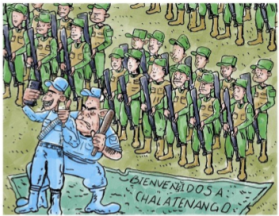30th Anniversary of the Jesuit Massacre
November 16, 2019, marked 30 years since the murder of six Jesuit priests, their cook and housekeeper, Elba Ramos, and Elba’s 16-year old daughter, Celina Ramos, on the campus of the University of Central America (UCA) in San Salvador. The events are now well known: In the early morning of November 16, 1989, members of the Salvadoran military’s Atlacatl battalion, led by 19 School of the Americas graduates, broke into the priests’ quarters and killed them and Elba and Celina Ramos in cold blood. The motive: to silence the priests’ outspoken criticism of the US-backed military dictatorship and more importantly to eliminate UCA rector Ignacio Ellacuría, who was working to negotiate an end to the armed conflict.
Thirty years later, despite ongoing efforts and several court denunciations of the murders as crimes against humanity, justice remains elusive. The 1993 Amnesty Law passed by a right-wing Salvadoran legislative assembly shortly after the signing of the Peace Accords gave blanket protection for decades to both the high-ranking military officials who ordered the murders (intellectual authors) as well as the soldiers who carried them out (material authors). In 2016, El Salvador’s Supreme Court declared the law unconstitutional and two years later a case that had been previously filed in El Salvador’s domestic court system was reopened. However, little action has been taken beyond that. Meanwhile in Spain where lawsuits have also been filed, only one of 20 officers indicted, Inocente Orlando Montano Morales, has been extradited (from the United States, where he was living) to stand trial. The rest have died or remain protected in El Salvador, where the Supreme Court continues to deny Spain’s extradition requests. In 2019, the Spanish court initially recommended a prison term of 150 years for Montano—30 years for each of the five Spanish priests who were killed in the massacre—but following reforms to Spanish law, a new request has been made to include the three Salvadorans killed, which would increase the sentence to 240 years. As of the 30th anniversary of the massacre, that trial is still pending. (For more details about the case, see this Jacobin article.)
The UCA community commemorated the 30th anniversary with two full weeks of programs (ongoing through the week of November 18) with the theme, “Llenan de luz la historia” (They illuminate history). As part of that theme, daily forums, photo exhibits, films, talks, and other events focused on the various ways that both the lives and the deaths of the Jesuit martyrs light the way toward a clear analysis of a painful past—and with it, a clearer path forward in struggle. Check out photos here.
One focus of the commemoration was to contextualize the massacre as part of a much longer story that includes all those in El Salvador and beyond who have participated—and are participating now—in the struggle to transform society, to “change the system at its roots,” as Oscar Romero said. A consistent message throughout the events has been social movement struggles taking place in El Salvador, Honduras, Ecuador, Chile, Bolivia, Brazil, as well as throughout Latin America, and beyond, have the potential to cohere into global working class revolution because of the collective work, analysis, and radical vision, of all those who commit their lives to struggle. Support for these struggles was beautifully demonstrated through art installations, including alfombras (traditional temporary “carpets” created from brightly colored sand and sawdust over which a procession later travels) made by students that carried messages of resistance, solidarity, sisterhood, liberation, and love.
Another central focus of the commemoration was migration. Indeed, many of the programs positioned migrants and migration as an essential element of resistance to the imperialist domination of the “global north.” At a forum titled “Meeting the legacy of the UCA martyrs” Cardinal Michael Czerny encouraged a reconsideration of new forms of martyrs and new reconfigurations of state-aligned capitalist repression—spaces that migrants, ICE, and border militarization can easily be seen to occupy. A message here was that, like the Jesuits, migrants illuminate history in demonstrating both the brutality of the capitalist order that forces people from their homelands as well as the ways that people are resisting.
An exhibition of photos taken by young Salvadorans entitled, “Migration: in search of a dream, the beginning of a nightmare” shows through images the reality of forced separation, displacement, discrimination, the extreme vulnerability of transit, and the profound trauma caused by US and Mexican immigration policies. The director of the UCA’s Romero Center where the photos are displayed said that choosing to center migrants in this year’s photo installation stemmed from the fact that, “The issue of migration is doubly important; first, because it is a way that our people are voicing their opposition to the social system, and second, because it is a means of survival.”
Finally, in a moving announcement broadcast over the campus-wide speakers at the end of Saturday’s events, the vigil itself was dedicated to Central American migrants. “We want to symbolize the march of our people along with all our martyrs, a march that continues to push history toward true liberation,” said UCA dean Andreu Oliva. As the massive vigil procession traveled the perimeter of the UCA campus on foot, guided through the night by at least a thousand candles—past the site of the murders and the rose garden that now grows in its place—El Salvador’s migrants, too, were remembered.

 "I am a CISPES supporter because continuing to fight for social justice and a more people-centered country means continuing the dream and sacrifice of thousands of my fellow Salvadorans who died for that vision.” - Padre Carlos, New York City
"I am a CISPES supporter because continuing to fight for social justice and a more people-centered country means continuing the dream and sacrifice of thousands of my fellow Salvadorans who died for that vision.” - Padre Carlos, New York City

